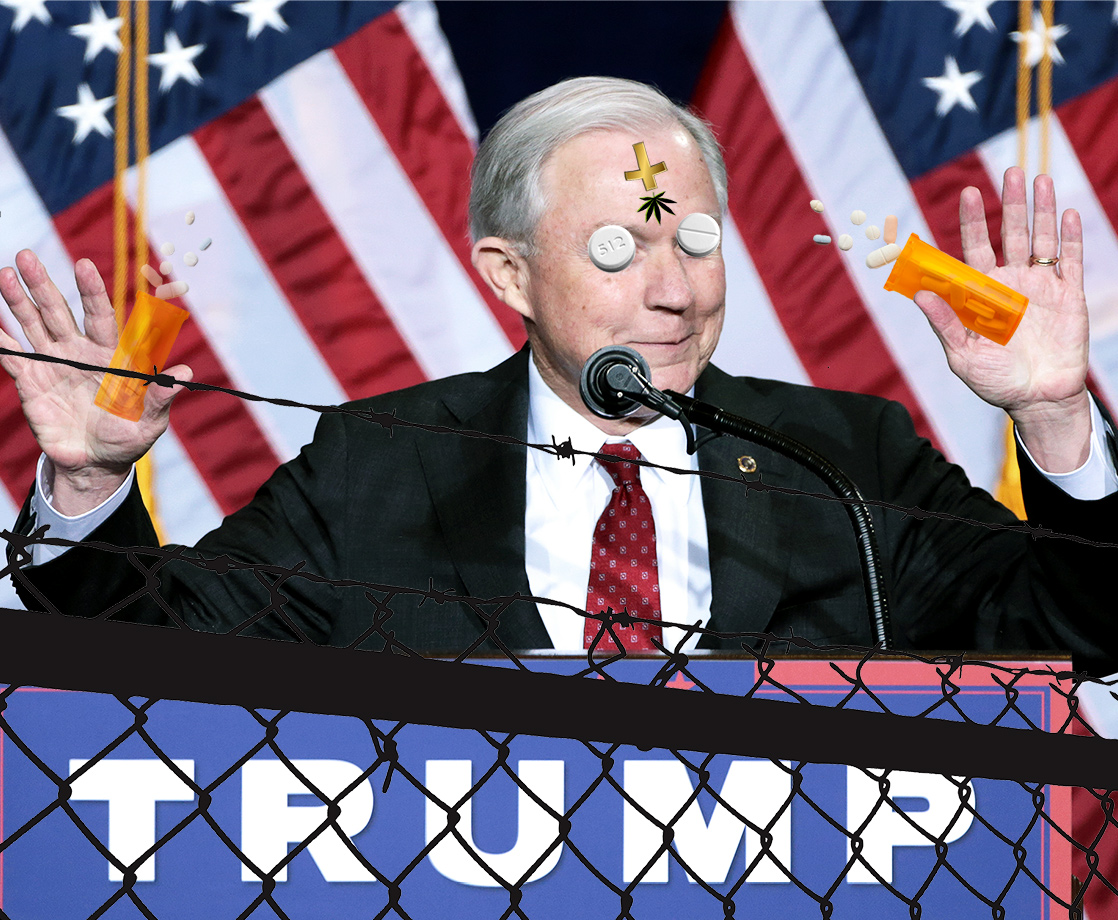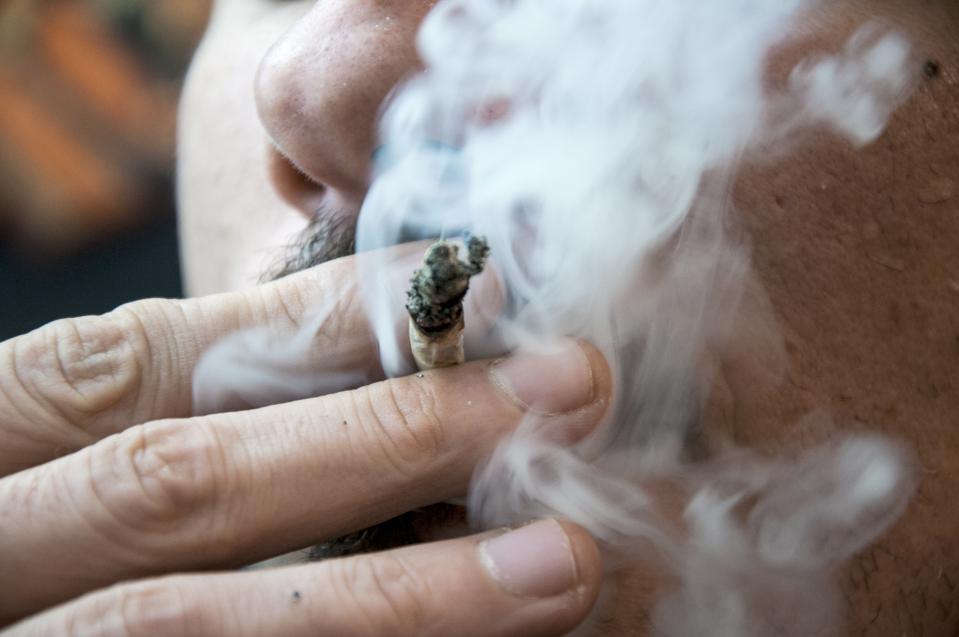Lead image by Sara Wass
Last weekend, Attorney General Jefferson Beauregard Sessions III (or, more likely, one of his aides) penned a bullshitty op-ed in The Washington Post with the title, “Being Soft on Sentencing Means More Violent Crime. It’s Time to Get Tough Again.” How the piece managed to run in The Washington Post –– whose reporters have done more to expose the chicanery of the Donald Trump’s administration than perhaps any other major newspaper –– is a miracle unto itself, and I’m not going to do the piece the dignity of actually linking to it, because I assume the paper ran it because they knew it would piss people off and they would shower in a storm of hate-clicks. Instead, I’ll say that even the Post itself seemed to understand that Sessions’s op-ed was bullshitty, because they ran a rebuttal that all but obliterated his argument. Still, if you want to read it, I won’t stop you––as my friend Trey likes to say, you’ve got the same Google that I got. Besides, the point of this article is for me to tell you why Jeff Sessions is a racist idiot who wrote a bad article, so I have to tell you what’s in it anyways.
Sessions’s op-ed is, by and large, his way of publicly justifying why he’s “empowering” (his word) federal prosecutors to apply mandatory minimum sentences to drug offenders –– a reversal of the policy of Barack Obama’s AG Eric Holder established in 2013. Though in effect, Holder’s directive had little practical impact, it was indicative of a potential sea change in how America views the so-called War on Drugs: as one that oppresses minority communities, rather than liberates them.
Pointing to an 11 percent climb in murders from 2014 to 2015, Sessions declares his predecessor’s ideas a failure and asserts that he wishes to target “major drug traffickers, gang members, importers, manufacturers and international drug cartel members.” Within the context of Holder’s policies before him, Sessions’ directive, regardless of the language in which it is rendered, gives prosecutors throughout the country license to both prosecute and persecute members of black and brown communities with a renewed zeal.
As the constitutional scholar David Cole has written, Jeff Sessions “seems like a throwback to [the Civil Rights] era––and not on the side of the heroes.” In addition to favoring harsher sentences for drug offenders, Sessions is also an opponent of allowing felons the right to vote, a policy that given our nation’s pattern of mass incarceration minorities on drug charges, creates a pattern that threatens to disenfranchise entire races. (It would be folly for me to not mention, at some point in this rebuttal, that a pair of Sessions’ former aides now lobby on behalf of the private prison industry. Here seems as good a place as any.)
To hear Sessions tell it, drug trafficking is a cause of societal ill rather than an effect, as if those in the drug game gravitate towards it because of some greater sociopathy rather than financial desperation. By and large, those who deal drugs would just as rather be doing something else –– it’s a dangerous gig, the hours are long (you can never take naps), the pay is rarely what it’s chalked up to be, and dealers are constantly faced with the mental stress of reconciling their wish to escape from impoverished neighborhoods with the knowledge that their chosen profession perpetuates the conditions they’re trying to leave behind. It’s arguable that those in black and brown communities turn to the black market drug trade because they’ve been shut out of traditional career opportunities. If members of these communities are denied access to the infrastructural necessities to help them escape poverty –– good schools, affordable healthcare and nutritional food, extracurricular activities designed to build real-world skills –– then they will continue to face a catch-22. By withholding these resources, governments create the pressure within individuals to make decisions they don’t want to make, such as joining gangs or selling drugs, and then punishes them for making those choices.
And then there’s the pharmaceutical industry, whose not insignificant contributions to the opioid epidemic Sessions’ op-ed ignores almost entirely. Last year, a Los Angeles Times investigation revealed that Purdue Pharma, the manufacturer of the blockbuster prescription opioid Oxycontin, knowingly marketed their product as providing twelve hours of pain relief, when in fact it was effective for only eight hours. Given that it’s basically heroin in a pill, Oxycontin can cause intense withdrawal, which, given the four-hour differential between the pill’s stated effectiveness and its actual duration, can lead to people popping pills more frequently than their doctor has told them to. And when a person’s prescription dries up, but their pain remains, the drug trade steps in to satisfy consumer demand. (As the libertarian publication Reason points out, states that have legalized medical marijuana generally see a downturn in opioid use. In a move that flies in the face of this data, after Sessions became Attorney General, he requested congressional approval to prosecute purveyors of legal marijuana.)
In his call to incarcerate minorities in the name of the War on Drugs, Sessions also disregards the effects of the dark web, which enables drug organizations to set up unlisted, Amazon-style e-commerce platforms and mail their wares directly to customers. It’s certainly reasonable to say that this is a problem of the U.S. government’s own making –– after all, the popular dark web browser Tor was originally developed by the Naval Research Laboratory, and despite its capability to serve as a portal into an online open-air drug market, the government still continues to fund it due to its utility for law enforcement agencies, intelligence assets transmitting information in dangerous locations, dissidents in nations with strict internet censorship, as well as those who have serious and legitimate privacy concerns. If Sessions were seriously concerned about combatting the opioid crisis, he might start by cracking down on pharmaceutical companies who use misleading claims to convince doctors to put dangerous drugs in the hands of consumers (which he won’t, but should), and monitor dark web activity in the hopes of catching those who operate darknet drug bazaars (which he shouldn’t, but might). To do otherwise is to further penalize those who hail from communities who need the government’s assistance –– not its wrath –– the most.
Still, it’s important to remember that like Donald Trump himself, Jeff Sessions does not represent a problem that will magically disappear on its own. Days after Sessions’ op-ed ran, a bipartisan Congressional coalition introduced a bill that, if passed, would increase penalties for manufacturers of synthetic drugs, with the intention of targeting the synthetic opiate Fentanyl. It’s an indication that even if Sessions were to magically disappear down whatever dumb-ass hole he popped out of, America is still unwilling to treat the drug trade as a symptom and not the disease.
Follow Drew on Twitter











